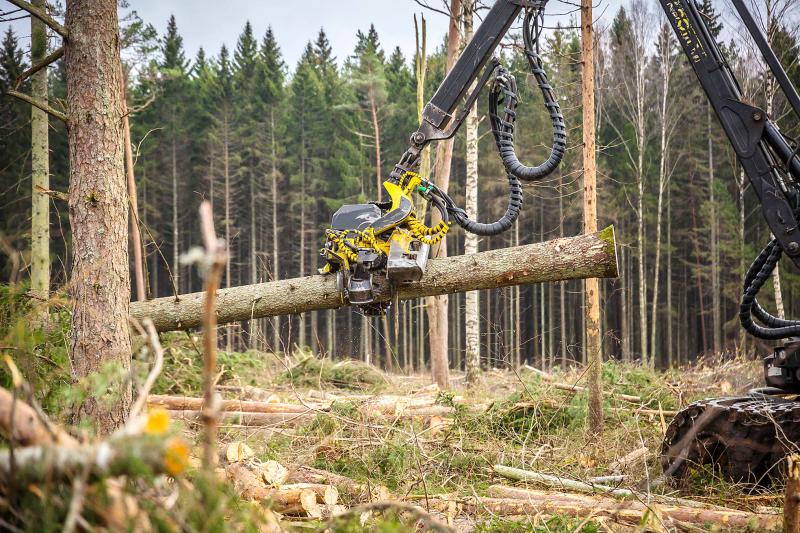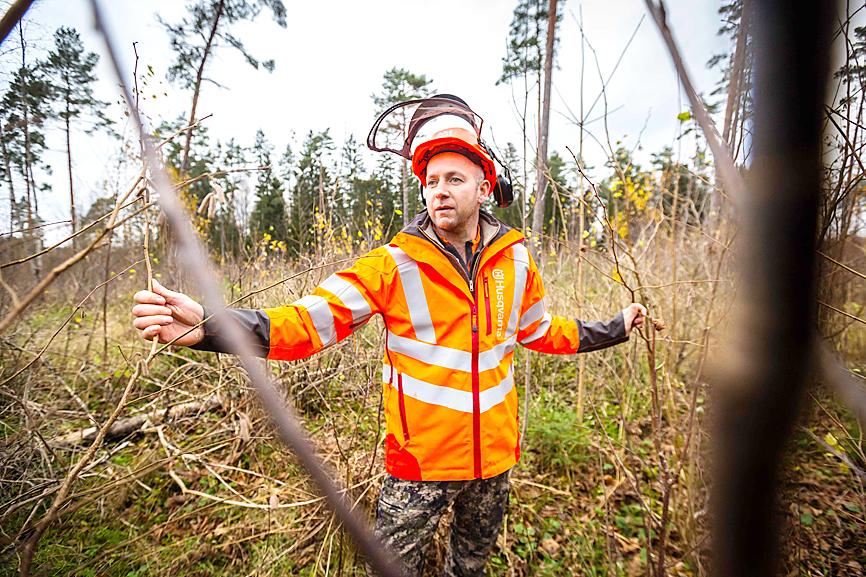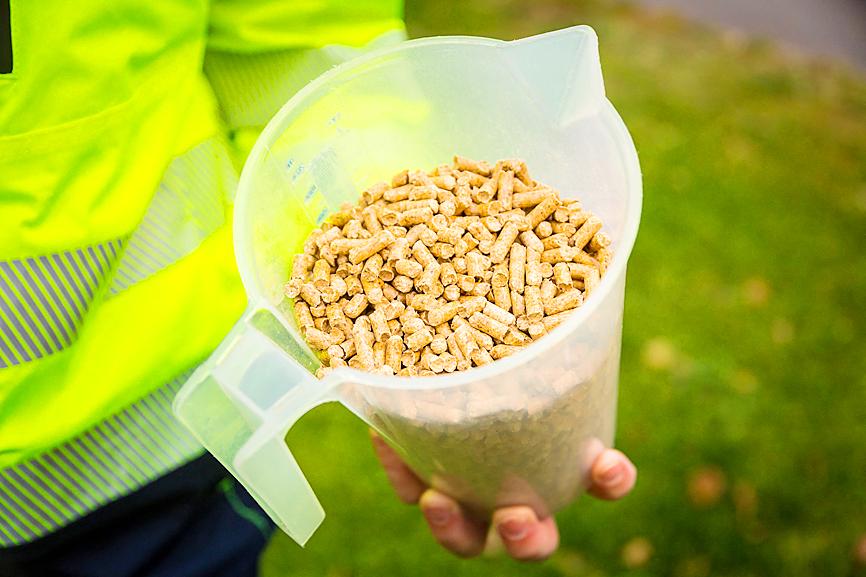Estonia’s thriving wood pellet industry is pitting environmentalists who say it increases logging and harms biodiversity against supporters who say it makes good use of wood that would otherwise go to waste.
The subject is particularly sensitive in the tiny Baltic state once ruled by Moscow, whose forests cover more than half its surface area and are very much part of the national identity.
However, at a plant belonging to Europe’s biggest wood pellet producer, Estonia’s AS Graanul Invest, Mihkel Jugaste, the company’s head of quality and certification systems, defended the industry.

Photo: AFP
“Wood only comes to us when sawmill or plywood factories reject it,” Jugaste said over the sounds of machinery turning logs into sawdust and compacting them into pellets.
Wood pellets are a type of biofuel that can be used in special pellet stoves or central heating furnaces for homes.
They are also used on a larger scale.

Photo: AFP
The former coal-fired power station of Drax in the UK now runs partially on wood pellets, including some from Estonia.
Environmentalists say biomass demand in western Europe is causing an intensification of logging in places such as Estonia, including in protected areas, and the use of techniques such as clearcutting in which entire areas of forest are destroyed.
They say that bird species such as the black grouse and woodlark are under threat from the logging, with woodland bird numbers falling by about one-quarter over the past two decades.

Photo: AFP
Their warnings have been heard in Brussels, and the European Commission earlier this year initiated infringement proceedings against Estonia for failing to ensure environmental impact assessments before issuing logging permits in these areas.
“The intensity of Estonian forest management is too high and pellet production within the forestry industry plays an important role,” said Siim Kuresoo, forest program coordinator at the Estonian Fund for Nature.
“The initial idea of allowing wood to be burned as renewable energy was only to lessen the waste of the industry. Now it has grown into a big industry by itself,” Kuresoo said.
Wood and wood product exports make up about 10 percent of Estonia’s total, and the value rose by 48 percent to 165 million euros (US$185.46 million) for the 12 months through August compared with a year earlier, official figures showed.
Graanul has also reported that its revenues last year rose to 438.9 million euros from 401.7 million euros in 2019.
Jugaste said his company respects and would continue to abide by any environmental protection regulation, but added that sometimes stakeholders disagree on what the rules should be.
“We, as a wood processor, cannot really decide for them,” he said.
“As long as experts make a decision about the protection status or the protection territory and that list is given to us, then we can protect it 100 percent,” he said.
An article in Nature Research last year found that there had been an 85 percent increase in logged areas in Estonia from 2016 to 2018 compared with 2004 to 2015 — one of the largest expansions in the EU.
At the same time, thanks to natural reforestation and planting, the overall forested area in Estonia last year increased to 2.3 million hectares from 2.2 million hectares in 2001.
The issue in Estonia is part of a wider European debate over whether wood pellets can be considered a carbon-neutral energy source as long as there is replanting of trees.
Many say they cannot because burning wood is as dirty as coal and trees take many years to grow back.
Taavi Ehrpais, a forest owner in northwest Estonia, said only about 10 percent of his timber — the lowest quality pieces — would end up in a pellet factory.
Ehrpais, who is also the head of Vardi Metsauhistu, a forest management organization, said it was “an unbelievable myth” that the wood pellet industry was leading to an increase in logging.
Ehrpais also defended logging laws, saying they are “very strict” and guarantee biodiversity.

Application-specific integrated circuit designer Faraday Technology Corp (智原) yesterday said that although revenue this quarter would decline 30 percent from last quarter, it retained its full-year forecast of revenue growth of 100 percent. The company attributed the quarterly drop to a slowdown in customers’ production of chips using Faraday’s advanced packaging technology. The company is still confident about its revenue growth this year, given its strong “design-win” — or the projects it won to help customers design their chips, Faraday president Steve Wang (王國雍) told an online earnings conference. “The design-win this year is better than we expected. We believe we will win

Intel Corp chief executive officer Lip-Bu Tan (陳立武) is expected to meet with Taiwanese suppliers next month in conjunction with the opening of the Computex Taipei trade show, supply chain sources said on Monday. The visit, the first for Tan to Taiwan since assuming his new post last month, would be aimed at enhancing Intel’s ties with suppliers in Taiwan as he attempts to help turn around the struggling US chipmaker, the sources said. Tan is to hold a banquet to celebrate Intel’s 40-year presence in Taiwan before Computex opens on May 20 and invite dozens of Taiwanese suppliers to exchange views

Chizuko Kimura has become the first female sushi chef in the world to win a Michelin star, fulfilling a promise she made to her dying husband to continue his legacy. The 54-year-old Japanese chef regained the Michelin star her late husband, Shunei Kimura, won three years ago for their Sushi Shunei restaurant in Paris. For Shunei Kimura, the star was a dream come true. However, the joy was short-lived. He died from cancer just three months later in June 2022. He was 65. The following year, the restaurant in the heart of Montmartre lost its star rating. Chizuko Kimura insisted that the new star is still down

While China’s leaders use their economic and political might to fight US President Donald Trump’s trade war “to the end,” its army of social media soldiers are embarking on a more humorous campaign online. Trump’s tariff blitz has seen Washington and Beijing impose eye-watering duties on imports from the other, fanning a standoff between the economic superpowers that has sparked global recession fears and sent markets into a tailspin. Trump says his policy is a response to years of being “ripped off” by other countries and aims to bring manufacturing to the US, forcing companies to employ US workers. However, China’s online warriors